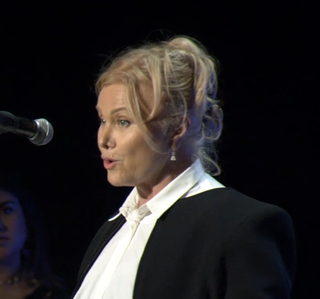A Quote by Betsy Hodges
Too often when we talk about racial or economic justice, we white people do not see ourselves in the picture. We feel like it's all well and good for other people to do better, but not at our expense, and it won't benefit us.
Related Quotes
Something similar happens on the other side of the equation: Giving kindness does us as much good as receiving it. . . . The true benefit of kindness is being kind. Perhaps more than any other factor, kindness gives meaning and value to our life, raises us above our troubles and our battles, and makes us feel good about ourselves.
When we talk about the word 'socialism,' I think what it really means is just democratic participation in our economic dignity and our economic, social, and racial dignity. It is about direct representation and people actually having power and stake over their economic and social wellness, at the end of the day.
…“white supremacy” is a much more useful term for understanding the complicity of people of color in upholding and maintaining racial hierarchies that do not involve force (i.e slavery, apartheid) than the term “internalized racism”- a term most often used to suggest that black people have absorbed negative feelings and attitudes about blackness. The term “white supremacy” enables us to recognize not only that black people are socialized to embody the values and attitudes of white supremacy, but we can exercise “white supremacist control” over other black people.
We see ourselves in other people’s eyes. It’s the nature of the human race; we are a species of reflection, hungry for it in every facet of our existence. Maybe that’s why vampires seem so monstrous to us—they cast no reflection. Parents, if they’re good ones, reflect the wonder of our existence and the success we can become. Friends, well chosen, show us pretty pictures of ourselves, and encourage us to grow into them. The Beast shows us the very worst in ourselves and makes us know it’s true .
As adult women, we're better able to protect ourselves emotionally. We understand we don't need to spend time with people who don't make us feel good. We recognise that some people have bad energy and we know we don't want that in our lives. Instead, we choose to spend time with people who love us and treat us well and make us happy. There's no doubt that shows on your face.
Consequential strangers help us stretch beyond the relatively rigid boxes that the people who have known us the longest - our family and close friends - often put us into. Through interacting with people who do not know us as well, we are more free to experiment with ourselves, and less likely to have our new behaviors and roles reflected back to us by people who object, 'But that's not like you!'
Our own personal salvation is to say, "I'm not going to judge myself, or let other people judge me, by my economic worth." We can't, obviously, control how other people will judge us, but - Life's too short to worry about those things. We can't control those things, but we can control how we feel about ourselves. And we work towards that. To say, "My life has been a success. Even if my bank account doesn't indicate it."
Many of us regard ourselves as mildly liberal or centrist politically, voice fairly pleasant sentiments about our poor children, contribute money to send poor kids to summer camp, feel benevolent. We're not nazis; we're nice people. We read sophisticated books. We go to church. We go to synagogue. Meanwhile, we put other people's children into an economic and environmental death zone. We make it hard for them to get out. We strip the place bare of amenities. And we sit back and say to ourselves, "Well, I hope that they don't kill each other off. But if they do, it's not my fault.
It is difficult to see ourselves as we are. Sometimes we are fortunate enough to have good friends, lovers or others who will do us the good service of telling us the truth about ourselves. When we don't, we can so easily delude ourselves, lose a sense of truth about ourselves, and our conscience loses power and purpose. Mostly, we tell ourselves what we would like to hear. We lose our way.
Cats make one of the most satisfying sounds in the world: they purr. [...] Almost all cats make us feel good about ourselves because they let us know they feel good about us, about themselves, and about our relationship with them. A purring cat is a form of high praise, like a gold star on a test paper. It is a reinforcement of soemthing we would all like to believe about ourselves -- that we are nice.


































